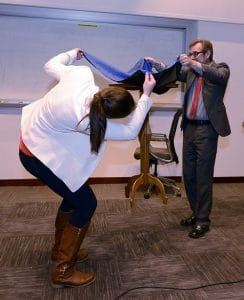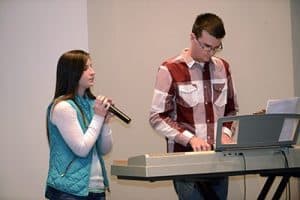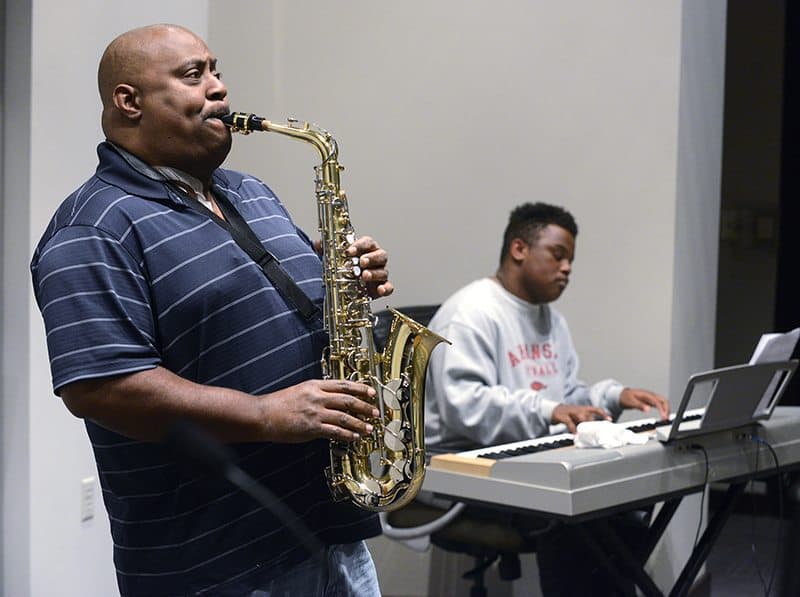Myeloma Awareness Takes Center Stage at Showcase
| April 6, 2016 | Local performers volunteered their time to entertain Myeloma Institute patients and staff March 30 during the F7 Myeloma Awareness Showcase.

Magician Richard Ellar levitates a table during the showcase. Ellar regularly volunteers his talents to perform for myeloma patients.
The showcase was planned by F7, UAMS’ inpatient bone marrow transplant unit, as part of Myeloma Awareness Month, said Richard Alcala, the unit’s patient activity and volunteer coordinator. Approximately 50 people attended.
“The showcase was a gathering of all of the volunteers who have given their time and talents to entertain our patients,” said Alcala. “We put together one big show to bring education and awareness through entertainment.”
Participating in the show were magician Randall Ellar, comedian Adam Hogg and two musical duos — Alarie Needham and Adam Smith from the Biscoe First Assembly of God Church who performed a religious medley of songs, and guitarists Kyle Bradshaw and Robert Gerke, who played classic rock numbers. Newly diagnosed myeloma patient Edwin Edwards also played his saxophone during the showcase.
Ellar, who regularly performs at the Myeloma Institute, encouraged patients to draw strength from their memories.
“I want you to think of wonderful memories in spite of where you might be in your life right now,” he said.

Alarie Needham and Adam Smith from the Biscoe First Assembly of God Church perform a spiritual medley during the showcase. The pair are a great encouragement to the patients, said Richard Alcala.
Needham and Smith often visit the inpatient unit to bring their inspiration, said Alcala, who added that they have been a continued encouragement to those patients who would otherwise have to miss church.
Edwards told the crowd that he is a longtime believer in the power of positive thinking. It helped him regain the use of his arms and legs after he was paralyzed in a motorcycle accident three years ago, he said, adding that it will help him now as he battles cancer.
“If you have the mentality that this is just a bump in the road, you’ll be alright,” he said.
Myeloma is a cancer of the blood’s plasma cells that develops in the bone marrow, said Myeloma Institute Director Gareth Morgan, M.D., Ph.D. Myeloma often results in weak, brittle bones and anemia.
Great strides have been made in treating the disease, he said.
“The past 10 years have seen myeloma go from an incurable disease to something where 60 percent of people can be fully cured. And UAMS has been at the forefront of pushing those developments,” Morgan said.

Steve Davis, an R.N. in Infusion 4, visits the Myeloma Institute as his alter ego Captain America during a Myeloma Awareness Month event. He is pictured with Faith Davies, M.D., the deputy director of the institute.
Morgan praised the event, saying it is “what Myeloma Awareness Month should be about.”
“How do we make patients’ lives better? How do we raise awareness? How do we keep the momentum going?” he said. “It is important that while we’re focused on improving cure rates, we’re also focused on patients’ well-being.”
The institute held several other events in March to celebrate Myeloma Awareness Month, including a smoothie bar for patients and caregivers, sponsored by Takeda; the Lucky Bake Sale on St. Patrick’s Day, sponsored by the Myeloma Institute Social Work Department; a Survivorship Care presentation for patients and their families, sponsored by Amgen; food trucks and a visit by Captain America, sponsored by Infusion 4; and a special presentation on the disease by Faith Davies, M.D., to the International Women’s Forum Arkansas.
Events like these are “our secret weapon,” because they “allow patients to get through everything and come out the other end of it smiling,” Morgan said.
